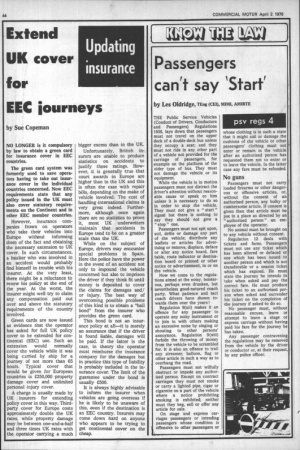Extend UK cover for EEC journeys
Page 46

If you've noticed an error in this article please click here to report it so we can fix it.
by Sue Copeman
NO LONGER is it compulsory by law to obtain a green card for insurance cover In EEC countries.
The green card system was formerly used to save operators having to take out insurance cover in the individual countries concerned. Now EEC requirements state that any policy issued in the UK must also cover statutory requirements on the Continent and in other EEC member countries.
However, insurance companies frown on operators who take their vehicles into Europe without informing them of the fact and obtaining the necessary extension to UK cover. In such circumstances, a haulier who was involved in an accident would probably find himself in trouble with his insurer. At the very least, there might be a reluctance to renew his policy at the end of the year. At the worst, the insurer might well try to claim any compensation paid out over and above the statutory requirements of the country involved.
Green cards are now issued as evidence that the operator has asked for full UK policy cover to be extended for continental (EEC) use. Such an extension would normally cover the vehicle while It was being carried by ship for a journey of not more than 65 hours. Typical cover that would be given for European countries is £250,000 property damage cover and unlimited personal injury cover.
A charge is usually made by UK insurers for extending policy cover in this way. Thirdparty cover for Europe costs approximately double the UK rates, while property damage may be between one-and-a-half and three times UK rates with the operator carrying a much bigger excess than in the UK.
Unfortunately, British insurers are unable to produce statistics on accidents to justify these ratings. However, it is generally true that court awards in Europe are higher than in the UK and this is often the case with repair bills, depending on the make of vehicle involved. The cost of handling international claims is very great indeed. Furthermore, although once again there are no statistics to prove it, most UK underwriters maintain that accidents in Europe tend to be on a greater scale than the UK.
While on the subject of Europe, drivers may encounter special problems in Spain. Here the police have the power in the event of an accident not only to impound the vehicle concerned but also to imprison the driver if they think fit until money is deposited to cover the claims for damages and/ or injury. The best way of overcoming possible problems of this kind is to obtain a "bail bond" from the insurer who provides the green card.
This bond is not an insurance policy at all—it is merely an assurance that if the driver is found 'liable, damages will be paid. If the latter is the case, in theory the operator must reimburse the insurance company for the damages but in practice this type of liability is probably included in the insurance cover. The limit of the guarantee under the bond is usually £500.
It is always highly advisable to inform the insurer when vehicles are going overseas if he is likely to be unaware of this, even if the destination is an EEC country. Insurers may come down bard on anyone who appears to be trying to get continental cover on the cheap.




























































































